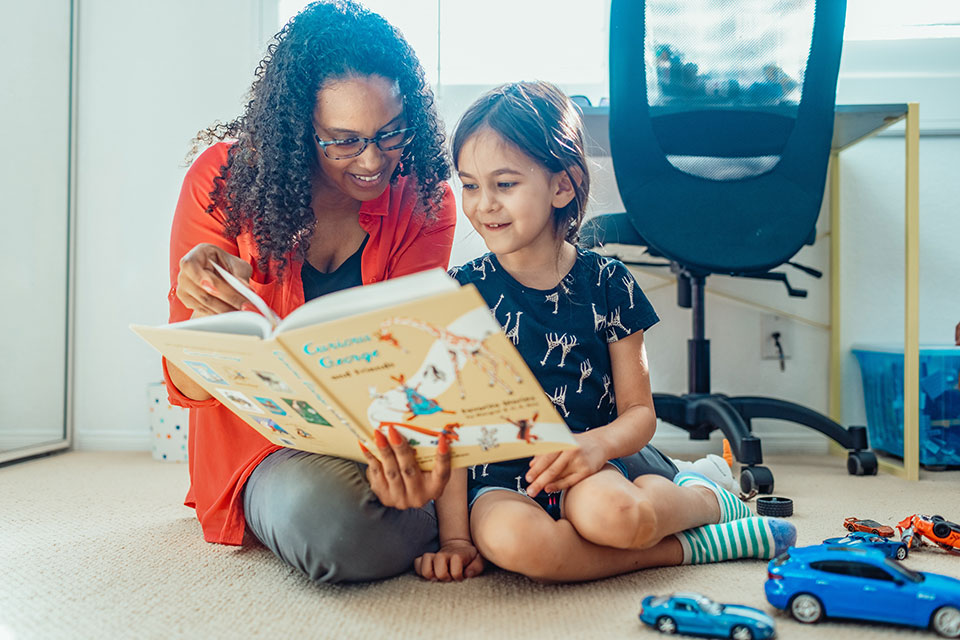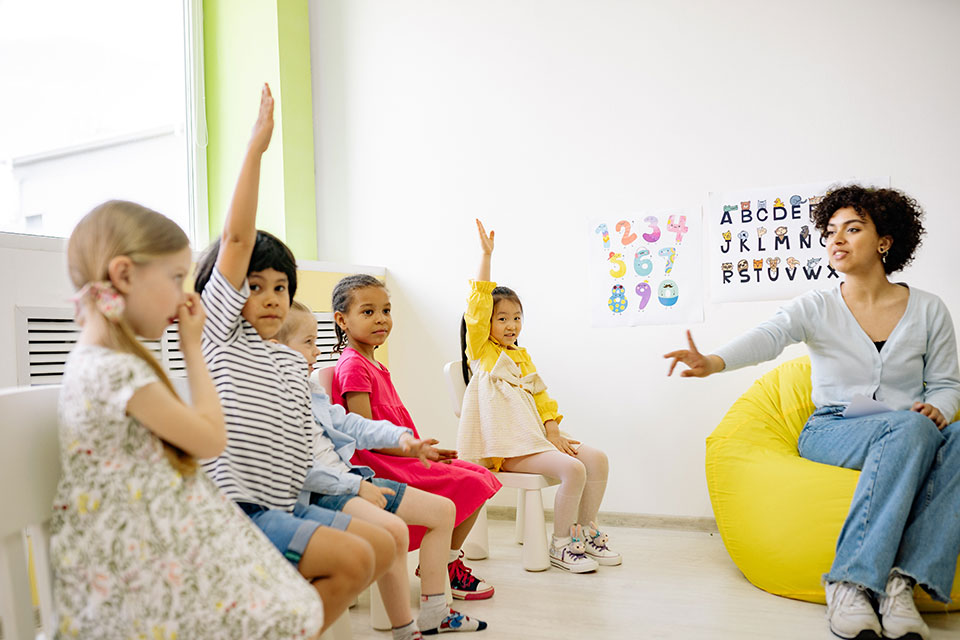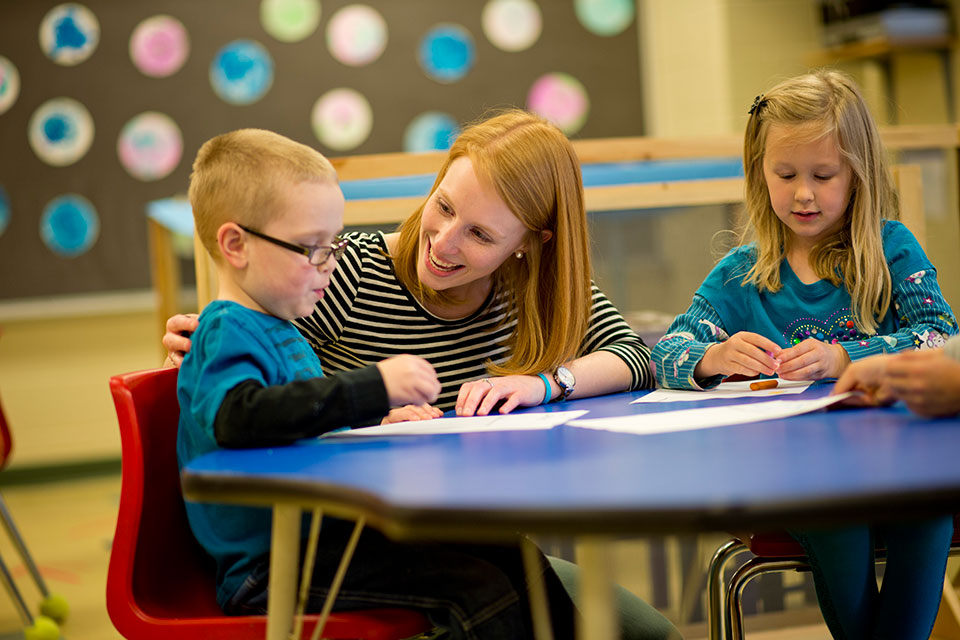
Understand What Makes Us Human
The Department of Human Development and Family Science’s (HDFS) many hands-on learning opportunities allow you to positively shape individuals across all stages of life, whether you’re gaining real-world teaching experience in an early childhood program or high school classroom, participating in service learning opportunities at local nonprofits and community centers, or generating knew knowledge through undergraduate research opportunities, including the capstone thesis for students majoring in developmental and family science.

Service Learning
All students who take HDFS 33100 (Skills for Helping Professionals in Individual, Family and Group Settings) course in the Department of Human Development and Family Science are required to find community partners to work with. This allows you to apply the group facilitation skills you learn in the classroom to a real-world setting. In these service learning projects, you will often lead meetings for organizations such as the YWCA Greater Lafayette Domestic Violence Intervention program or Recovery Café Lafayette.

Internships
The Department of Human Development and Family Science coordinates a formal internship program for students in the developmental and family science and human services majors. These internships are semester-long experiences (fall, spring or summer) that are based in a variety of agency settings, including community centers, government agencies, healthcare facilities and more. Internship placements are tailored to meet your professional interests as well as promote learning, skill development and professional behavior in your field of study.
In addition to the departmental internship program, HDFS-related internships are offered through Purdue Extension and are open to any HDFS major.
About the HDFS Internship Program
The HDFS Internship Program fulfills the capstone experience requirement for the undergraduate human services major in HDFS 45500. It is also available as a selection for the capstone requirement for the developmental and family science major in HDFS 45800.
Internship placements are arranged through the preparatory course HDFS 45400 (Career Assessment and Professional Development), based on student, agency and department agreement. Beginning in fall 2020, if you choose to major in human services, you may elect to add the addiction studies concentration, which requires a specialized internship.
Students majoring in human services will complete an internship in one of the following formats:
- Full-time internship (12 credits) at 40 hours per week for 16 weeks (fall/spring)
- Half-time internship (six credits) at 20 hours per week for 16 weeks (fall/spring)
- Full-time internship (six credits) at 40 hours per week for eight weeks (summer only)
Students majoring in developmental and family science may complete an internship in one of the following formats:
- Half-time internship (six credits) at 20 hours per week for 16 weeks (fall/spring)
- Full-time internship (six credits) at 40 hours per week for eight weeks (summer only)
Internship Placement Sites
Internship placement sites may represent a broad range of settings related to human services, developmental and family science, and related fields, including:
- Nonprofit, for-profit or government agencies (e.g., community centers, family resource centers, autism centers, elder care facilities, correction facilities, military installations, etc.)
- Indirect services (e.g., fundraising, program development, grant-writing, technical assistance, etc.) or direct services to clients (e.g., program implementation, case management, outreach/education, family support services, etc.)
- Human needs (e.g., poverty, disability, criminal offenses, health and wellness, etc.)
- Human service programs
Human services majors are required to take a series of courses designated as “practical skills,” which prepare you for clinically-oriented roles. Because the developmental and family science curriculum does not include this preparation, developmental and family science majors will not be placed in internship roles that include clinical tasks, such as counseling services, risk assessments or working with families who are receiving services due to abuse or neglect. However, it is still possible for DVFS majors to be hired into these roles following graduation, as many organizations have extensive training for new employees.
Internships are often local placements but may be completed in other locations as long as the capstone requirements are met as defined by the HDFS 45400 instructor. For a list of some past and current internship placement sites, view our internship site partners.
HDFS Internship Program site partners
The Department of Human Development and Family Science appreciates the ongoing collaboration of each of our site partners. We’re also always interested in partnering with agencies that can offer high-quality experiences and supervision. The following documents may be useful to you in supporting current or future interns.
Contact an Internship Coordinator
Natasha Watkins, watkinsn@purdue.edu, 765-496-2106
Cézanne Elias, chaas@purdue.edu, 765-494-2944

Student Teaching
To provide you with real-world experience instructing young children or adolescents, the Department of Human Development and Family Science requires that students majoring in early childhood education and exceptional needs or family and consumer sciences education complete a semester of full-time student teaching, so you can practice your skills in a classroom setting.
In collaboration with the Office of Clinical Practice in the College of Education, you may be placed in public or private schools as well as appropriate community agencies, including accredited early childhood programs and Head Start. Placements are aligned with the program curriculum as well as your interests.

Ben and Maxine Miller Child Development Laboratory School
The Department of Human Development and Family Science’s Ben and Maxine Miller Child Development Laboratory School provides high-quality education and child care to the local community while also offering a space for students majoring in early childhood education and exceptional needs to develop professional teaching skills and gain experience working with young children. You will also have opportunities to participate in the planning, implementation and evaluation of appropriate education activities; observe children’s reactions to the routines of the day; study their progress through the program; and develop skills interacting with and positively guiding individual children and groups.
The Miller Child Development Laboratory School also fosters many research opportunities for students across the College of Health and Human Sciences (HHS) to advance new knowledge and interventions in early education programs and child development. Learn more about the Miller Child Development Lab School.